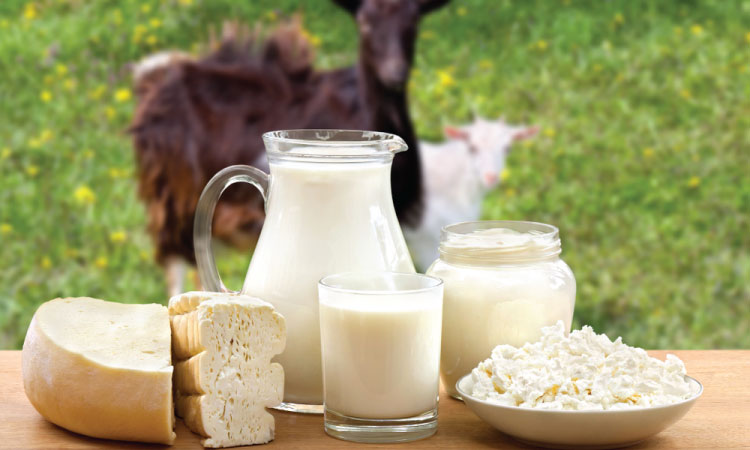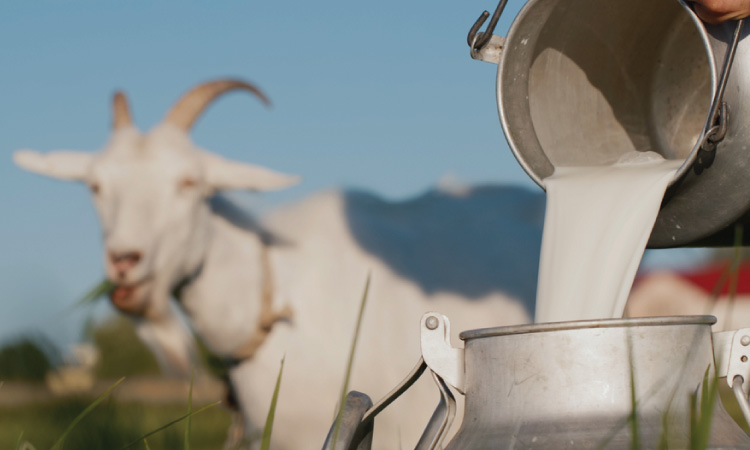Once your baby turns an year old, many mothers look to introducing alternatives to breast milk. Cow milk is perhaps the most common milk fed to babies. However, there are other alternatives. Many women try to branch out and choose other types of milk, such as goat milk. So if you are wondering if you can give goat milk for babies, here is everything you need to know.
Other than being a rich source of some minerals, the bioavailability of minerals in goat milk is higher than of minerals in cow milk. This means some minerals are in better absorbable form in goat milk when compared to cow milk.
Goat milk can have several nutritional benefits for your little one, but is it safe for them?Can goat milk be given to infants? When should you give it to them? This article sheds some light on such topics.
Is Goat Milk Safe For Babies And Toddlers?
If you follow the appropriate timeline to introduce it to the baby and choose to feed in the right manner, goat milk is not only safe but also beneficial for the baby.
In fact, Ayurveda believes that goat milk has a relatively close resemblance to breast milk than many other types of animal milk. Therefore, when it comes to safety we can say goat milk for 1 year old is generally safe.
Having said that, it needs to be emphasized that it is important to understand when to start goat milk for babies. In spite of all its benefits, introducing goat milk to the baby too early can trigger some issues.
Note: One of the main downsides of choosing goat milk for babies is its less availability. It is not as easily accessible as cow milk. However, packaged goat milk is now available in many leading stores.
Related Reading: 10 Foods That Make Breast Milk Taste Good (Indian)
When Can Babies Be Introduced To Goat Milk
Giving goat milk for babies as an ingredient before they turn 6 months or regular use between 6 and 12 months is a big no. At the same time, you can use it as an ingredient in baby food once the baby reaches 6-months. Also, you can try giving baby paneer made from goat milk once he is older than 8 months.
Goat milk is more similar to cow milk in its composition than human milk. Therefore, like cow milk, goat milk is not appropriate to give a baby below one year.
Also, goat milk is not an alternative to breastfeeding. This means your baby still requires breast milk. If possible breastfeed the baby at least for the first 2 years. It is also not recommended to use goat milk instead of formulas.
Goat milk as the main drink should only be given to babies after 18 months of age.
Related Reading: Cow Milk For Babies – Benefits, Risks, and Precautions
What Are The Benefits Of Goat Milk For Kids

Goat milk is a natural source of many crucial vitamins and minerals. These include vitamin A, vitamin D, vitamin C, B vitamins (B1, B2, and B2). It also contains essential minerals like calcium, iodine, phosphorous, zinc, and magnesium. Goat milk also is an excellent source of protein and fatty acids.
Switching your baby over to goat milk can have numerous benefits. Some of the top goat milk benefits are:
1. Goat milk is easier to digest
All kinds of milk contain a sugar called lactose. Lactose is one of those elements hard to break down by the baby’s digestive system. The amount of lactose in goat milk is relatively very less than that of cow milk. Therefore it is easy to digest.
Also, protein in goat milk is less dense than cow milk. Likewise, the fats in goat milk are made up of short-chain fatty acids that are easily breakable. Hence, babies who face digestive issues while consuming cow milk may benefit from switching over to goat milk.
2. Lower risk of allergies
Lactose, casein protein, alpha-S1, and beta-lactoglobulin are the milk components that can trigger an allergic reaction in babies.
Goat milk has many advantages when it comes to allergies as compared to cow and buffalo milk. This is so because in goat milk,
- The lactose level is considerably low
- Contains only a trace amount of casein protein and alpha-S1
- Moreover, Casein protein in goats milk has some striking similarities to casein protein in human milk
Note: Even then, goat milk is not 100% risk-free when it comes to allergies. The level of one of the allergenic proteins, beta-lactoglobulin is the same in cow milk and goat milk. Therefore, even though not as allergenic as cow and buffalo milk, goat milk can be allergenic to kids who are allergic to beta-lactoglobulin. That is why it is said that children who are allergic to cow milk can be allergic to goat milk as well.
3. Good source of Vitamin A
Goat milk has a higher vitamin A content. Studies show that Vitamin A deficiency can trigger many issues in children and increase the morbidity and mortality rate significantly. Goat milk is an important source of vitamin A. Giving goat milk for babies helps to enhance their eyesight, facilitate the proper functioning of organs like the lungs, heart, and kidneys.
4. Remarkable levels of prebiotics
The majority of diary-based milk has prebiotics (types of fiber that feed the friendly bacteria) and probiotics (beneficial/ friendly bacteria) that enhance gut health and digestion. When compared to other dairy-based milk, goat milk has a higher level of probiotics.
5. Goat milk promotes overall growth in children
Goat milk is enriched with protein, which is the building block of cells, tissues, muscles, and bone. It is also blessed with good fat (polyunsaturated fat) that is easily absorbed by the body. Protein and good in goat milk promote the overall growth of the baby.
6. Helps to boost immunity
Goat Milk is an excellent source of Selenium, a rare but vital mineral that plays an important role in enhancing the immune system. The immune systems of babies are not as strong as those of adults and they are prone to infections. Goat milk for babies can help to keep infections at bay to some extent.
Related Reading: Coconut Milk For Babies – Nutritional Value, Benefits, And Risks
7. Better bioavailability of iron
Even though cow milk and goat milk are a good source of iron, according to research, the bioavailability of iron is significantly higher in goat milk. Only 13 % of the iron in cow milk is absorbed by the baby’s body. On the other hand, 50% of the iron in goat milk is absorbed by the baby’s body.
In short, if you give an equal amount of goat milk to one baby and cow milk to another one, the baby who had goat milk receives more iron than the one who drank cow milk.
8. Decreases the chances of gastrointestinal infections
The pH of goat milk is more or less as same as in breast milk. Which means, goat milk, like breast milk is alkaline in nature? Cow milk, on the other hand, is acidic in nature. The pH of goat milk is, thus, beneficial for babies as it reduces the risk of gastrointestinal infections significantly.
9. Goat milk can improve the bone health of anemic infants
According to a study mineral loss in bones that happens due to anemia was significantly reduced when the affected person drink goat milk for a period of time. Hence, goat milk is an excellent choice for infants who are anemic.
10. Can be beneficial for babies with colitis
Goat milk is well known for its anti-inflammatory property. According to studies, these features can be beneficial for babies who more at risk of gastrointestinal diseases like colitis.
Basic Differences Between Goat Milk And Cow Milk
The mineral content of goat milk and cow milk is almost the same. Even then, there are some remarkable differences as well. According to a source, goat milk contains 134% more potassium 47% more vitamin A, 25% more vitamin B-6, and 13%more calcium when compared to cow milk.
Goat milk also contains three times more niacin four times more copper than cow milk. Moreover, goat milk also carries 27% more selenium, an antioxidant, when compared to cow milk.
Risks And Precautions To Take When Feeding Goat Milk To Babies

It is very important to know the risks and precautions associated with goat milk for babies. We have collated the same below-
Risks
- Can take a toll on renal health: While the level of sodium is high in goat milk, the concentration of chloride and potassium is also very high. This high level of minerals can potentially increase the renal solute load for babies.This can bring about gastrointestinal bleeding, which in turn can result in anemia and poor growth. This is one of the major goat milk risks
- Increase the risk of Megaloblastic anemia: Goat milk contains five times fewer vitamin B-12 and ten times less folic acid when compared to cow milk. Vitamin D level is also low. These nutrients are vital for the baby to create healthy red blood cells. The deficiency of these minerals can increase the risk of the baby contracting megaloblastic anemia.
- Goat milk for babies and risk of allergy: Infants who are allergic to cow milk protein can be allergic to goat milk as well.
- Risk of dehydration: Goat milk is extremely high in protein. Therefore, the little one’s body has to produce extra urine to get rid of this extra nutrition. Frequent urination without proper replacement of fluid can increase the risk of dehydration.
Precautions
It is important to follow some tips when you choose goat milk for babies:
- Always give pasteurized goat milk to the baby
- You can choose pasteurized and fortified milk that comes in a tetra pack
- If you choose to buy it from a farm, make sure it is collected in a hygienic way
- It is found that many mothers have a practice of straining the goat milk before pasteurizing. They pass the goat milk (collected from the farmer) through muslin clothes to make sure no goat fur gets into the milk. You can also follow it if you get milk from a farmer
- As the amount of folic acid in goat milk is 10% less than that of cow milk, it is important to make sure it is supplemented with folic acid before making it the main drink of infants and toddlers
How to pasteurize goat milk?
To pasteurize the milk you can use the double boiling technique. For this pour the milk into a stainless steel bowl and place the bowl over the vessel of boiling water. Stir continuously. By means of a thermometer check the temperature of the milk.
Once it reaches 165° Fahrenheit, wait for 15 seconds and remove the bowl and place it on a plate filled with ice cubes ( to bring down the temperature fast). Unlike boiling milk, pasteurizing milk help to kill the harmful bacteria at the same time retain the fresh taste of milk.
Conclusion

The nutritional value of milk depends on what type of milk it is, but there is no denying that goat milk has several nutritional benefits for your little one. It is a rich source of several essential nutrients.
However, there are risks to watch out for and precautions to take. Try to only introduce it to your baby after they turn one year old. Even then, the process should be gradual and cautious.
And when it’s done, and your baby develops a liking for the taste, there is a wide range of benefits they can experience!
FAQs
A formula that is based on goat milk is very different from normal goat milk. According to a study, it is very similar to breast milk. So, it is very beneficial for the baby’s health, and you need not wait until the first birthday to give it to them.
Goat milk formula is also a great substitute for cow milk formula if the baby experiences digestive issues due to the latter. Giving goat milk formula to the baby will also make the transition to goat milk easier.
Yes. While it is not common, sometimes babies develop an allergy to goat milk, just as they sometimes get allergic to cow milk. In fact, according to research, since the proteins present in both types are almost the same, babies allergic to cow milk are often also allergic to goat milk.
Yes, after they turn one year old, you can give them goat cheese and yogurt. But keep in mind that they will not provide them with as many nutrients as goat milk. You can provide these nutrients for your baby through other sources.
Organic is always the best option when it comes to your baby. Though it is more expensive, it is also more nutritious. So, if you can, buy organic goat milk for your little one.
If you buy packaged milk, make sure it is pasteurized or sterilized, so that it is free of harmful microbes. Fortified milk is also a great option, as it has a lot more important nutrients. Tetra-pack milk of good brands usually has these features.
While full of nutrients, goat milk is not recommended for babies under one year. It can be difficult to digest properly. It can cause intestinal bleeding and bloody stools. It can also disrupt the nutritional balance of the baby. Many even have allergic reactions.
Since both have different nutritional compositions, it can be tricky to determine which is healthier. The healthier option for your baby may not be the healthier option for another. It depends on the nutrients you are in need of.
Goat milk is richer in Vitamin A, potassium, and calcium. Cow milk is richer in Vitamin B12, folic acid, and selenium.

